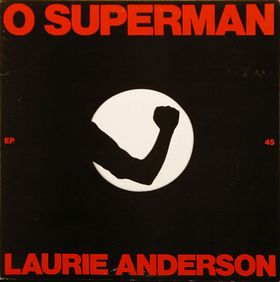Really?
Now I’m not so naive to actually believe that, at least when it comes to pop culture, some things might actually be sacred. But seriously: what’s “O Superman” doing in a cell phone commercial? Suddenly the tired arguments about artists “selling out” with their licensing choices feel freshly relevant. Not that I think Laurie Anderson has sold out, nor do I begrudge her whatever money she might be making from a 30-year-old song that might only be regarded as a “hit” in the most artsy-NYC-hipster-ish sense. (It did top the Village Voice’s 1981 Pazz & Jop singles poll.) But there is something sad about such a monumental song reduced to… this.
If you’ve never heard “O Superman”, you may be asking yourself just what the big deal is. And if you’re just hearing “O Superman” for the first time, you should know: it’s damn weird. But it’s also wonderful. As proud as I am that my son could identify it so readily, he was a tiny bit wrong in pronouncing “O Superman” an “awesome song”. It certainly is awesome, and I don’t mean “awesome” in the deeply trivializing 80s-vintage colloquialism sense, but rather in the Old Testament music to bring down the walls of Jericho sense. It is awesome. But to call it simply a song is also a little trivializing.
For one thing, it’s just not very song-like. For another, it’s massive: eight-and-a-half minutes massive, sustained without benefit of a catchy chorus or an extended guitar jam or even a drum solo. The music is stark and electronic, the words poetic and prayerful, and delivered (through a vocoder) alternately as a monologue and a chant – ah-hah-hah-ah hah-hah-hah-ha-ah. It is by turns funny and sweet (“Hi Mom!”), and chillingly prophetic:
Here come the planes
They’re American planes
Made in America
Smoking
or Non-smoking
There’s also a visual element that is integral to the song itself. In live performance, Laurie Anderson would play her synthesizer with one hand, and with the other, punctuate her lines with hand and arm gestures projected as shadows in a circle of light on a screen behind her.
Laurie Anderson “O Superman” (1981)
The song was first released as a NEA-funded limited edition 7″ single in 1981; the following year it became the centerpiece of Anderson’s major label debut record Big Science, which, itself, was conceived as part of an epic scale multi-media performance piece called United States, inspired largely by a four-year field trip Anderson took around the country, working various sorts of jobs as she went. “O Superman” is still regarded as Anderson’s masterpiece, and in the same way the “Hallelujah Chorus” (all 100 or so seconds of it) has become “bigger” than the larger work it was part of (Handel’s “Messiah” oratorio), “O Superman” has eclipsed United States in sheer concentrated power and historical resonance.
The song was inspired by the aria O Souverain, O Juge, O Pere, from French composer Jules Massenet’s opera Le Cid, and alludes to its words. Laurie Anderson described the aria as a “prayer for a knight on the eve of a hopeless battle… a prayer about empire, loss, and ambition.”
‘Cause when love is gone, there’s always justice.
And when justice is gone, there’s always force.
And when force is gone, there’s always Mom.
“O Superman” was also inspired by current events: specifically a tragically failed military mission during the Iran hostage crisis of 1979. But 9/11 and the government’s ongoing struggle to respond to it – both the military interventions in Iraq and Afghanistan, as well as the domestic policies passed in the name of security – have given the new song an even more powerful and unforeseen resonance. Here’s Laurie on performing the song to a New York audience a week after 9/11, from her notes to the 2007 reissue of Big Science:
“During a top-secret mission to rescue hostages being held in Tehran, American helicopters crashed in a sandstorm and blew up. The mission’s failure was a blow to the United States’ reputation as a technological superpower and played a role in the downfall of the Carter Administration and the rise of Reaganism. Almost thirty years later we’re fighting the same war… I suddenly realized I was singing about the present.”
So yeah, how about that skydiving fashion photographer? Here’s the song that opens the Big Science album:
Laurie Anderson “From the Air” (1982)

